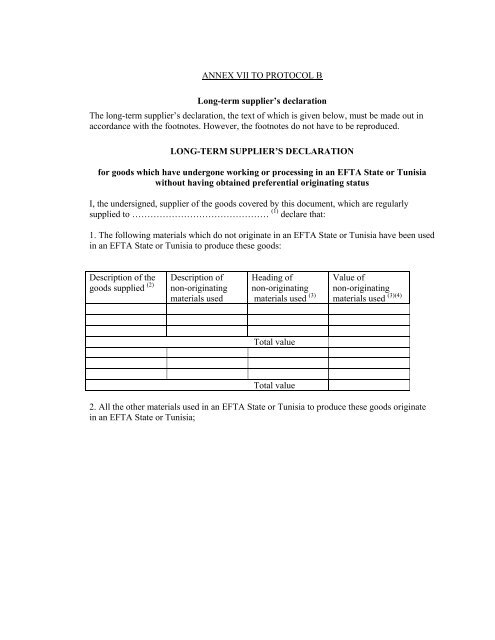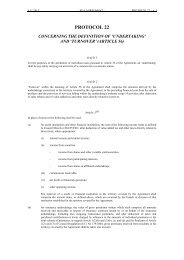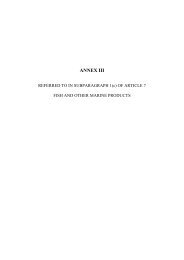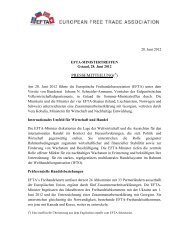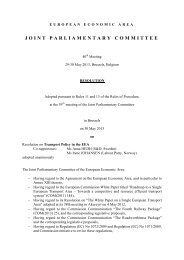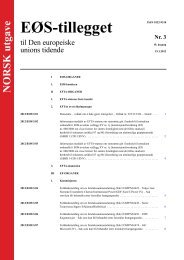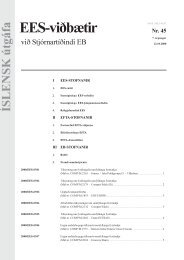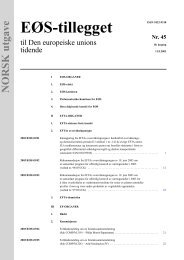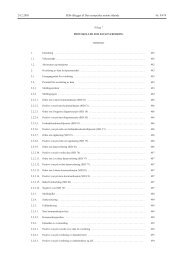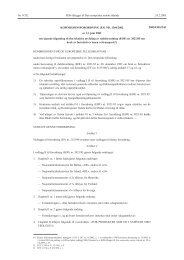Long-Term Supplier's Declaration - EFTA
Long-Term Supplier's Declaration - EFTA
Long-Term Supplier's Declaration - EFTA
You also want an ePaper? Increase the reach of your titles
YUMPU automatically turns print PDFs into web optimized ePapers that Google loves.
ANNEX VII TO PROTOCOL B<br />
<strong>Long</strong>-term supplier’s declaration<br />
The long-term supplier’s declaration, the text of which is given below, must be made out in<br />
accordance with the footnotes. However, the footnotes do not have to be reproduced.<br />
LONG-TERM SUPPLIER’S DECLARATION<br />
for goods which have undergone working or processing in an <strong>EFTA</strong> State or Tunisia<br />
without having obtained preferential originating status<br />
I, the undersigned, supplier of the goods covered by this document, which are regularly<br />
supplied to ……………………………………… (1) declare that:<br />
1. The following materials which do not originate in an <strong>EFTA</strong> State or Tunisia have been used<br />
in an <strong>EFTA</strong> State or Tunisia to produce these goods:<br />
Description of the<br />
goods supplied (2)<br />
Description of<br />
non-originating<br />
materials used<br />
Heading of<br />
non-originating<br />
materials used (3)<br />
Total value<br />
Total value<br />
Value of<br />
non-originating<br />
materials used (3)(4)<br />
2. All the other materials used in an <strong>EFTA</strong> State or Tunisia to produce these goods originate<br />
in an <strong>EFTA</strong> State or Tunisia;
- 2 -<br />
3. The following goods have undergone working or processing outside an <strong>EFTA</strong> State or<br />
Tunisia in accordance with Article 12 of Protocol B to the Agreement between the <strong>EFTA</strong><br />
States and Tunisia and have acquired the following total added value there:<br />
Description of the goods supplied Total added value acquired outside an <strong>EFTA</strong><br />
State or Tunisia (5)<br />
(Place and date)<br />
(Address and signature of the supplier; in addition the name of the<br />
person signing the declaration has to be indicated in clear script)<br />
This declaration is valid for all subsequent consignments of these goods dispatched<br />
from………………………………………………………………<br />
to………………………………………………………………... (6) .<br />
I undertake to inform……………………………………………. (1) immediately if this<br />
declaration is no longer valid.<br />
……………………………………<br />
(Place and date)<br />
………………………………………… ……………………………………<br />
………………………………………… ……………………………………<br />
………………………………………… ……………………………………<br />
(Address and signature of the supplier; in<br />
addition the name of the person signing<br />
the declaration has to be indicated in<br />
clear script)<br />
(1) Name and address of customer.<br />
(2) When the invoice, delivery note or other commercial document to which the declaration is annexed<br />
relates to different kinds of goods, or to goods which do not incorporate non-originating materials to the<br />
same extent, the supplier must clearly differentiate them.<br />
Example:<br />
The document relates to different models of electric motor of heading 8501 to be used in the manufacture<br />
of washing machines of heading 8450. The nature and value of the non-originating materials used in the<br />
manufacture of these motors differ from one model to another. The models must therefore be<br />
differentiated in the first column and the indications in the other columns must be provided separately for<br />
each of the models to make it possible for the manufacturer of washing machines to make a correct
- 3 -<br />
assessment of the originating status of his products depending on which model of electrical motor he<br />
uses.<br />
(3) The indications requested in these columns should only be given if they are necessary.<br />
Examples:<br />
The rule for garments of ex Chapter 62 says that non-originating yarn may be used. If a manufacturer of<br />
such garments in Tunisia uses fabric imported from an <strong>EFTA</strong> State which has been obtained there by<br />
weaving non-originating yarn, it is sufficient for an <strong>EFTA</strong> State supplier to describe in his declaration<br />
the non-originating material used as yarn, without it being necessary to indicate the heading and value of<br />
such yarn.<br />
A producer of iron of heading 7217 who has produced it from non-originating iron bars should indicate<br />
in the second column 'bars of iron'. Where this wire is to be used in the production of a machine, for<br />
which the rule contains a limitation for all non-originating materials used to a certain percentage value, it<br />
is necessary to indicate in the fourth column the value of non-originating bars.<br />
(4) 'Value of materials means the customs value at the time of importation of the non-originating materials<br />
used, or, if this is not known and cannot be ascertained, the first ascertainable price paid for the materials<br />
in an <strong>EFTA</strong> State or Tunisia.<br />
The exact value for each non-originating material used must be given per unit of the goods specified in<br />
the first column.<br />
(5) 'Total added value' shall mean all costs accumulated outside an <strong>EFTA</strong> State or Tunisia,<br />
including the value of all materials added there.<br />
The exact total added value acquired outside an <strong>EFTA</strong> State or Tunisia must be given per unit of<br />
the goods specified in the first column.<br />
(6) Insert dates. The period of validity of the long term supplier’s declaration should not normally<br />
exceed 12 months, subject to the conditions laid down by the customs authorities of the<br />
country where the long term supplier’s declaration is made out.


